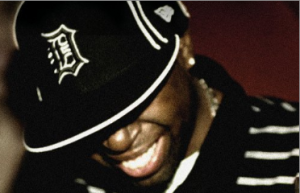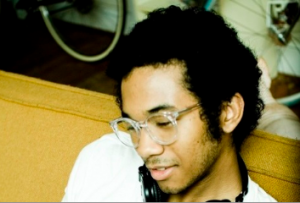“Imprint After”, the third track on Toro Y Moi’s bafflingly great Causers of This begins with some party-time piano, then, sorta morphs into an indie version of 80s-era Genesis (drums lead the melody, a stupid “I Can’t Dance”-like use of jagged falsetto trick) and finally, vocally, gives in to the twitching disembodied vocal samples, which get to ride-out into the next track, “Lissoms”. “Lissoms” skitters back and forth, glitch-like, but it’s really just a production nerd exercise in stretching-out a cathartic horn line for as long as possible and then, doing it a couple more times.
The next track, “Fax Shadow” is a crunched-up, warm, weird loop of a bunch of stuff (an R & B singer going “feels so good”, some twinkling piano, like maybe part of a drum) and despite the previous two tracks’ trajectory toward this sound, I wouldn’t blame you if you picked up your iTouch to see if somehow you hit “Shuffle” by accident and now playing is some random J Dilla instrumental. But that’s not what happened–and you realize much of Causers of This reveals the kind of Dilla fetish you’d expect to find on the latest Black Milk or Khrysis production, but not on a Chillwave album.
Among the many reasons this is fascinating is because it’s quite clear that Chillwave, that very much maligned, embarrassingly named indie subgenre (I still prefer “Wave-wave”), derided for being insular and non-commital and lots of other bad stuff, very much has its ears open. That it isn’t simply swiping goofball sounds of 80s via some synth presets, but finding weird, awesome indirect ways to conjure up very specific, nostalgia-soaked emotions.
“Talamak”, THA CHILLWAVE ANTHEM FOR 2010 BRO, might be the first stand-alone successful attempt at singing/rapping over one of those insular, not-made-for-singing/rapping Donuts-style Dilla beats songs compositions. Along with “24″, the Khrysis beat that ends Little Brother’s excellent Leftback, and has these weird near-subliminal coughs and whoop-whoops beneath it, “Talamak” is the most fascinating piece of production this year. There’s rap and R & B and nods to hip-hop production in Toro Y Moi’s music and it’s as natural as any other sound healthily mucking up his indie pop; A sideways answer to Sasha Frere-Jones’ “A Paler Shade of White”.
Toro Y Moi’s production has less to do with say, Kid Cudi rapping over Ratatat, jj covering fucking “Birthday Sex”, or B.O.B’s weird radio career, and more to do with, Swizz Beatz slicing and dicing “D.A.N.C.E” into a Jay-Z hit, Trae rapping over an Electric Wizard sample, WAVVES possessing some Dipset swagger, Ratatat being clearly in love with The Neptunes, and yeah, Solange covering The Dirty Projectors.
It’s probably worth noting that Chaz Bundick aka Toro Y Moi is of mixed heritage (Black and Filipino), but that doesn’t negate Chillwave’s casual affront to the very white indie of the aughties, it’s one more way that the subgenre’s weirder and more open than people want to realize. Chillwave’s also a scene of mostly provincials (Southerners at that) and that’s still kinda scary to New York-centric critics…it’s also just confusing. There’s a great deal more mixing and merging of sounds, ideas, and cultures in the South than East Coast types can really comprehend. And because it doesn’t manifest itself as proper fusion or like, minority-tinged indie outta Brooklyn, it’s easy to dismiss or just not even connect the dots.
Plenty of critics hear the Dilla connection, but very few know what to do with it. Donuts is a confusing piece of music and that’s exactly what allows its influence to spread in so many directions. Released on Stones Throw, an indie label with a lot of visibility and a fan-base beyond just hip-hop heads, Donuts appealed to more than just beat freaks. To rockist and indie ears, who probably don’t even understand the medium of the beat-tape, Donuts was a weird piece of turntablism or a DJ mix (even though it isn’t) or walking along side that Prefuse 73 album everyone liked in 2003. To enjoy its sound, to ingest it and poop it out as one’s own music too, doesn’t necessarily mean you are making hip-hop–except you are.
Friend of Toro Y Moi and fellow Southerner, Ernest Greene aka Washed Out also grabs a great deal from hip-hop. Though his Life of Leisure EP is stoner dance music, smoothed out and warm–no place for digital crackles and skips–it’s full of warbly, weirdly-tweaked samples, that not only turn old songs into new ones, but drastically moderate the overall feeling of the originals. Pitchfork’s Mark Richardson in his “Resonant Frequency” column, discussed Washed Out’s “Feel It All Around”, and how it came from Gary Low’s “I Want You” and also, more importantly, how it totally diverges from the Italo sample source:
Around the time Washed Out’s “Feel It All Around” first hit last year, the sample source from the track was revealed to be the 1983 Italo song “I Want You” from Gary Low. The bouncy keyboard and twinkly starburst synth of the Low track had already served as the basis for a couple of songs, but Ernest Greene of Washed Out slipped it some downers, cutting the tempo and the pitch and giving it a crackly warble of distortion. That the loop from the original track was, speed aside, relatively untouched did nothing to take away from Greene’s re-contextualization: in his hands, with the addition of his voice, it became something else entirely, and something pretty great.
Richardson’s description of Washed Out’s production wizardry reads a lot like the hundreds of rap nerds (myself included) writing about Donuts like it contains the key to all mythologies: “Something’s going on here and dude made this sound like this and technically, this is what he did, but there’s still some never-get-to-the-center something else to it and oh shit, one night that change-up brought me to tears.”
If you read my defense of Chillwave, you’ll notice I said “Feel It All Around” was “basically this Style Council song” and some wiseguy in the comments section said “the Washed Out song is actually a song by a guy named Gary Low, just slowed down.” It’s worth noting this comment was posted four days after Mark Richardson’s article, but the point I was making, and where Chillwave becomes Dilla (if that makes any sense) is that indeed, a slightly-changed Gary Low song, in the hands of Washed Out, sounds more like another song altogether. Weird.
That’s the thing about Donuts too–it’s Dilla’s best work, but it’s not his most technically great or most artful. Indeed, what he did to those songs can seem underwhelming once you hear the originals, but something else is going on. Washed Out and Toro Y Moi get that something. And it’s more than glitching up or messing around with some random-ass samples, but glitching/messing them up towards some emotional end. Washed Out’s follow-up, High Times is more explicitly Dilla/hip-hop influenced than Life of Leisure which just kinda does the same tricks Dilla does. Save for the Men At Work-ish single “Belong”, the EP is wandering, very short Donuts-esque instrumentals. Ernest Greene tries his hand at Ruff Draft muthafucka. The last four tracks, “Last”, “It’s Kate’s Birthday”, “You Will Be Sad”, and “Yeah” are even in Petestrumental territory, which is just crazy.
“Hip-hop”, like “punk rock” was and still is an adjective to a lot of people and when you know, Producer A takes Song X, turns it into Song Y, and plays it for Producer B and Producer B goes, “Oh shit, Song Y is dope! You took Song X and made it fuckin’ sound like Song Z! That’s hip-hop!”, a producer’s done something right. Dilla’s maybe the king of this and now, years after his death, and thanks to Stones Throw, a label equal parts devoted to keeping his legacy alive and draining every last cent out of it, Dilla’s even got some indie/electronic nerds from the South making some shit that is indeed, hip-hop. It’s no coincidence that the two guys that get this, who are deserving of the adjective “hip-hop”, are the most promising of this odd, burgeoning, Chillwave scene.
further reading/viewing:
-Google Results for “Toro Y Moi Dilla”
-“Resonant Frequency” #68 by Mark Richardson for Pitchfork
-“In Defense of Chillwave” by ME for Sound of the City
-“Swedish Twee-&-B Duo jj Cover “Birthday Sex.” Why?” by Rob Harvilla for Sound of the City
-“A Paler Shade of White” by Sasha Frere-Jones for The New Yorker


 The most polite coup of popular music took place in the late 90s via “Neo-Soul”. Though a wrongheaded, rockist-bait term nearly from its inception, the music of Neo-Soul–you know, the part that actually matters–casually but radically shifted what R & B and rap could and would do to this day.
The most polite coup of popular music took place in the late 90s via “Neo-Soul”. Though a wrongheaded, rockist-bait term nearly from its inception, the music of Neo-Soul–you know, the part that actually matters–casually but radically shifted what R & B and rap could and would do to this day.

 -First…Douglas Martin of Fresh Cherries from Yakima is doing a “Jay Stay Paid Day” all uh, day today posting links and comments and responses to the album and it’s a lot of fun. Below is my contribution, a quick write-up of my favorite Jay Stay Paid song (at least for right now) “In the Night/While You Slept (I Crept)”:
-First…Douglas Martin of Fresh Cherries from Yakima is doing a “Jay Stay Paid Day” all uh, day today posting links and comments and responses to the album and it’s a lot of fun. Below is my contribution, a quick write-up of my favorite Jay Stay Paid song (at least for right now) “In the Night/While You Slept (I Crept)”:





